THE EAST INDIAN By Brinda Charry,
Harper Collins, Rs 499
Dickens giveth and he taketh away. Worse than being an orphan is being one created by Charles ‘Boz’ Dickens himself, for life becomes, almost alarmingly, very interesting. Dead mothers, icy fathers, the blandishments of teenage. Benefactors: spurned. Kindness: a game of shadows. Bodies thrilling under sooty tears. The blossoming of hearts and loins. Tony East Indian, the protagonist in this novel teeming with storytelling frisson, has a tale in similar tradition, albeit differently ambitious and polemic, with a glance askew from southerly climes.
Brinda Charry accomplishes an astute note of contemporaneity in her novel, a meld of history and fiction, which is set in the 1600s — a time period that straddles modernity and ancientness. Tony is a low-class Indian from the Coromandel coast, and is the first East-Indian person to set foot on American soil. En route, he has taken fancy to the changeling — traditionally a child substituted for a couple’s real baby — in A Midsummer Night’s Dream, the latest play by one William Shakespeare. The changeling is an Indian character who is coveted by a royal couple as if he were a gilded vase. Tony comes to find the character’s tussle and his objectification canonical to the story of his life: he has been rechristened, baptised, shipped to a different land. This new identity sours him. He wants to “go home.” Before that can even be dreamt of, he has to endure having an erection in the middle of not totally unexciting company. His hands are painted with young blood. He wails about his master being pinned to a tree by an arrow. He is besotted with and bamboozled by sprightly women.
Dreaming is cheap. For Tony and his sidekicks, little Sammy, haughty Dick, slave wretches all, dreams are sobs of lifegiving air. When fresh country is broken into, undulating clefts and folds of terrain and estuary, do the invaders really care if they also capsize the lives of an untouched people? The colour of skin is a diktat with the same ferocity as god’s instruction to Moses; an unbreakable code that erodes native claims to their clod of the earth. For the whites, black is but one shade — they call all non-white people “moors”. Colour kindles community in unlikely places in this stately novel, an origin story in the inspiration of Maggie O’Farrell, taking mythologised characters and imbuing them with ennui and depth, and also a virtuoso chronicle of a veritable immigrant experience, almost picaresque, always true.
Charry drinks deeply from the well of Shakespearean scholarship, being a formidable authority on the Bard herself, and leavens it with quick charm and balmy wit, where the humdrum procedures of growing up effortlessly inspire a spell of weepiness or raucous laughter. The Danish prince’s dilemma — ‘to be or not to be’ — is a trusty credo for immigrants. Assimilation to a new country is also annihilation of your old ways. In a Ship of Theseus fashion, at what point does Tony stop being an ‘East Indian’ and become an ‘American’, at a time when there wasn’t even an ‘India’ to speak of? Charry unleashes masterly imagery on the currency of homesickness and eerie portents of not having anything to go home to.
There is subliminal relevance to our times, not least in the fact that Tony is an immigrant who wants to make it as a medicine man in North America. Having gambled Tony away to another white man, Tony’s master cautions him: “Give me a black man or a white boy any day — these brown ones are the worst. Think they are better than both.” Brinda Charry’s novel is a work in the timeless tradition of the dusty bildungsroman: rapid, sweaty, relentless and vital, a herald of 17th-century disquiets in quicksilver snatches of sadness and vim, both reminiscent and completely original.










